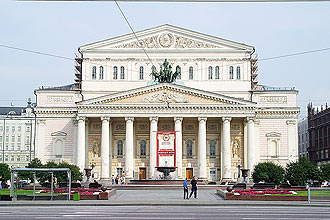See all Attractions in Moscow
The Bolshoi Theatre
1, Teatralnaya Ploshad, Moscow, 103009, Russia Phone: +7 (495) 250-7317 http://www.bolshoi.ruAbout
Although in recent years the Bolshoi has been beset by financial and artistic difficulties, and somewhat overshadowed by the remarkable resurgence of St Petersburg's Kirov, it is still one of the greatest theatres in the world, with its own proud traditions and unforgettable atmosphere. An evening at the Bolshoi really is an essential part of a visit to Moscow. The building itself is one of Moscow's most symbolic sites, a truly impressive example of Russian Classical architecture that faces the Kremlin walls, and some fairly tacky open air bars and restaurants, with proud indifference. The Bolshoi is the second biggest opera house in Europe (after La Scala), and grandeur and artistic strength are combined in everything from the impressive statue of Apollo that crowns the facade to the ballet's famously muscular style of choreography. 2002 saw the opening of a new stage, with state-of-the-art sound and lighting equipment and a more intimate atmosphere akin to that of a Tsarist court theatre. The Bolshoi takes its role as Russia's national theatre seriously, and the policy is to ensure that 70% of its repertoire is made up of Russian masterpieces. In recent years the company has made every effort to increase the number of works by 20th century Russian composers not performed or little performed in the Soviet Union, and some of the most exciting recent additions to the repertoire have been ballets and operas by Prokofiev, Shostakovich, Stravinsky, etc. For genuine lovers of opera and ballet, it is worth doing some research before choosing the performance you wish to attend, as quality can be variable. For the rest of us, the breathtaking beauty of the setting, the idiosyncrasies of Russian theatre-going and the historic atmosphere should be more than enough to guarantee a truly memorable evening out. It is possible to book tickets on the internet, but it works out considerably more expensive than going to the theatre box office. However, some performances sell out very fast, so it may be worth the extra cost. See the "Useful Information" section for details. The main stage of the Bolshoi Theatre will be closed for reconstruction until 2008. Performances of larger productions may be staged at the State Kremlin Palace. The company of the Bolshoi was originally founded in 1776 by Prince Peter Urusov and English impresario Michael Maddox as the Moscow Public Theatre. Maddox became the sole owner in 1780, and a building was constructed for the company on Petrovskaya (now Teatralnaya) Square, on the site of the present theatre. Fire destroyed the building in 1805, ruining Maddox and bringing the theatre under Sate control, to be renamed the Imperial Theatre. The company was briefly housed in a wooden building on Great Arbat Square, but this also succumbed to fire during Napoleon's invasion of 1812, and in 1824 Petrovskaya Square was rebuilt in the Classical style, with a new building for the theatre designed by Osip Bove. At the time it was second only to La Scala in size, with a 2,200-seat auditorium. Fire struck again in 1853, once more destroying the theatre, but this time it only took three years before the present building was constructed by architect Albert Kavos, based on Bove's plans. It was reopened to coincide with the coronation of Aleksander II, in August 1856. At the start of its life, the Moscow Imperial Theatre was something of a provincial cousin to its St Petersburg counterparts, but the arrival in the 1890s of the great choreographer Alexander Gorsky and, soon after, of such legendary singers as Fyodor Chaliapin, Leonid Sobinov, and Antonina Nezhdanova boosted its fortunes. Amongst other pre-revolutionary stars, Sergei Rachmaninov was the principle conductor from 1904-06. After the Revolution, the theatre initially faced hostility from the Bolsheviks as a superfluous symbol of elitist bourgeois culture, and funding was cut dramatically. But traditions survived and, after the Second World War, the Bolshoi became a dom
